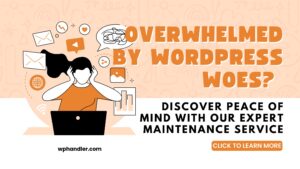Understanding the Importance of Regular WordPress Maintenance
Why Regular Maintenance Matters
You might think that once your WordPress site is up and running, the job is done, right? Wrong! From my own experience, skipping regular maintenance can lead to slow load times, broken links, and poor user experience. These factors can seriously hurt your SEO rankings. Keeping your site updated is like giving it a regular health check — it keeps everything running smoothly!
When you keep your WordPress updated, you not only secure your site against potential hacks but also ensure that it performs optimally. I’ve seen firsthand how a simple update can bring back lost traffic. It’s super important for both the site’s security and its visibility on search engines.
Moreover, regular maintenance increases the longevity of your site. A well-maintained site can serve you for years, saving you the hassle of starting all over again. Trust me, your future self will thank you for dedicating a bit of time to maintenance now!
Cleansing Your Database for Better Performance
Why Database Cleanup is Essential
Your WordPress database can easily become cluttered with spam comments, draft posts, and other unnecessary data. When I first started managing my site, I had no idea how much junk was accumulating in my database. Cleaning it out regularly makes a world of difference in performance and speeds things up significantly.
A clean database not only enhances loading times but also makes it easier for search engines to crawl your site effectively. A speedy site is appealing to both users and search engines alike. Trust me, when your visitors have a smooth experience, they’ll stick around longer, which can also positively impact your SEO rankings.
There are plenty of easy-to-use plugins that can help you with this task, but you can also do it manually if you’re feeling adventurous! Just make sure you back up your site before diving in — that’s a crucial step I learned the hard way!
Optimizing Images for Faster Loading Times
The Importance of Image Optimization
Images are essential for making your content visually appealing, but they can also slow down your site if not optimized correctly. Believe me, I’ve made this mistake before, uploading high-resolution images without thinking twice. But optimizing images not only improves loading speed but also enhances your SEO!
When you compress and resize images, you minimize the amount of data that needs to be loaded when a user visits your page. For me, this means fewer bounce rates and better engagement metrics. Plus, search engines like Google love fast-loading pages, so this gives you an added boost!
There are several plugins available for image optimization, but you can also use online tools to do it manually. I always recommend finding a balance between quality and size to keep your site looking sharp without sacrificing performance.
Conducting Regular SEO Audits
What is an SEO Audit?
You may have heard about SEO audits, but what are they really? An SEO audit is like a health check for your website’s search engine optimization. For me, conducting regular audits has been a game-changer in boosting my visibility on search engines. It helps identify areas that need improvement and keeps your site aligned with SEO best practices.
During an audit, I usually check for broken links, outdated content, and keyword optimization. Finding and fixing these issues can significantly enhance your site’s performance. It’s eye-opening to see how little tweaks can lead to big gains in traffic!
Many tools can help you in conducting an SEO audit, and I recommend setting a schedule—perhaps quarterly. This way, you stay on top of your game and ensure nothing falls through the cracks. Consistency is key in maintaining a solid SEO strategy!
Backup Your MySQL Database Regularly
Why You Need Regular Backups
Backing up your MySQL database is one of those tasks that often gets overlooked until it’s too late. Trust me, I’ve had my fair share of harrowing experiences when I didn’t back up my site — it’s terrifying! Regular backups save you from potential disasters like data loss or corruption, which can be catastrophic for your site.
A good backup strategy ensures that you can restore your website to its previous state if something goes severely wrong. I’ve even established a routine for myself: after major updates or changes, I backup my database. It just gives me peace of mind knowing my hard work is safe!
There are plenty of plugins that automate this process, which is a real lifesaver. I’ve found that setting aside time for backups is well worth it in the long run. Don’t let the unexpected ruin your beautiful website!
Frequently Asked Questions
1. What is WordPress maintenance?
WordPress maintenance refers to the regular tasks performed to keep your website running smoothly. This includes updates, backups, security checks, and database cleanups, among others.
2. How often should I perform maintenance on my WordPress site?
I recommend performing maintenance at least once a month, but some tasks, like backups, should be done more frequently—ideally after every major change or update.
3. Is it necessary to clean up my database?
Absolutely! A clean database enhances performance, reduces loading times, and ensures a smoother user experience. Cleaning it helps with your site’s overall efficiency!
4. What tools can I use for SEO audits?
There are various tools available like SEMrush, Moz, or Google Search Console. They can help you identify SEO problems and suggest fixes, making the auditing process easier.
5. How can I optimize images for my WordPress site?
You can optimize images using plugins like Smush or ShortPixel, or by manually compressing images through online tools before uploading them. Keeping them at an optimal size improves your site speed!

